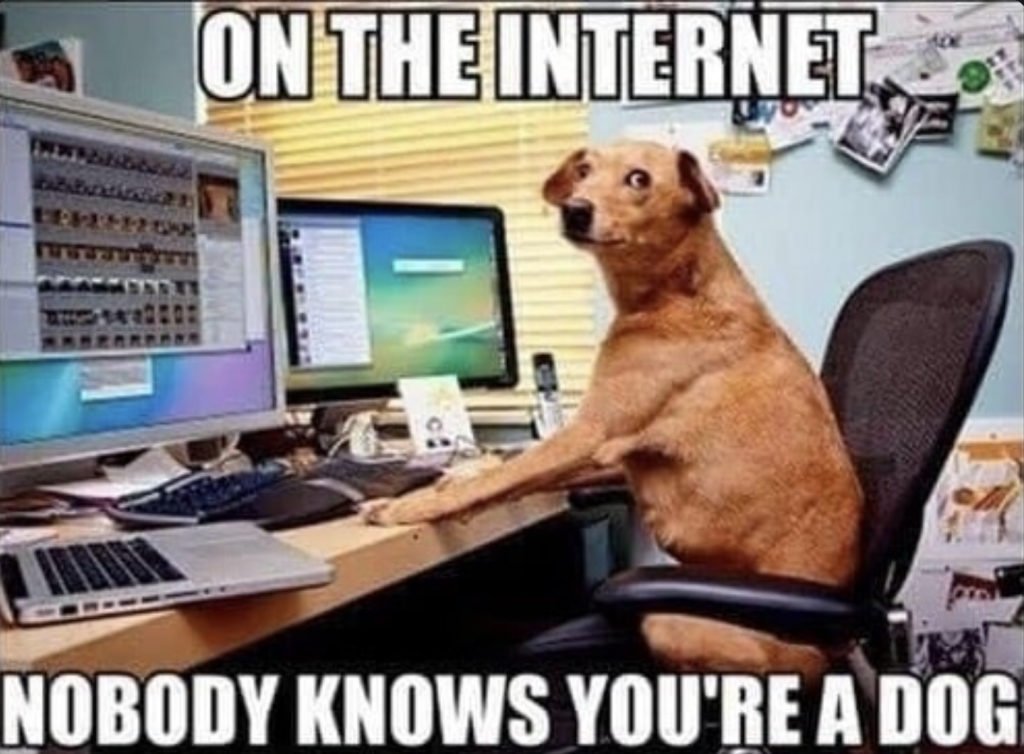
The open web, the nlweb, and will it be different next time?
Google won the open web. They won the browser. They won search. They won display. And that distribution position means they intermediate demand for a massive swath of the economy.
The winner nearly took it all. They did pretty well. Their founders flourished. The hungry shareholder got more than a taste of that cheddar.
And the consumer realized some surplus as well. (Calm down, Chicago School, I see you.)
So when Microsoft announced the nlweb, the natural language web, a few days ago, I wondered where the real discussion would happen.
I have thoughts.
Attention, Distribution
I’ve written a lot this year about speech, deliberation, and distribution.
Your attention is the coin of the realm.
You don’t have a lot of it, and everybody wants a piece. You should feel both flattered and a little bit hesitant. Maybe you’re inner wolf loves deregulation, but your inner sheep is, perhaps, quietly, horrified?
The open web is wild.
And it’s loaded with belief-speaking and lies: “On the Internet, nobody knows you’re dog.”

Which is only part why the walled gardens were set up in the first place.
Google had won the Open Web.
So how could you possibly compete? You needed to differentiate against the Open Web. You couldn’t go open, so you needed to go closed! The Open Web was hard. We’re easy! The Open Web was seedy. We’re virtuous! The Open Web was dangerous. We’re safe!
The Apple App Store. Facebook. Twitter. Wall. Wall. Wall.
They’re certainly more convenient. They were made to be less seedy – thirst traps had to leave breadcrumbs. And for awhile it was supposedly more safe. Maybe.
Steve Jobs vowed that what happened to Microsoft on the Open Web and their operating system wouldn’t happen to him and his smartphone operating system. He set up the app store and controlled the distribution of apps. So better as to protect people from bad actors, viruses, and malware. And, you know, in exchange for fee processing and policing the store, you know, they could take a cut of the gross. Not net. Straight off the top. Wet that beak a little. Zuckerberg tried something similar within the walls of Facebook with the open graph. When that didn’t work he tried the metaverse.
If code is speech, then these are moderated environments.
Code may be speech. And that may be interesting to think about.
You know what else is speech?
Speech.
And there were attempts to moderate speech.
Twitter is still censored in some places. And by censored, I mean, the state intervenes to prevent the expression and distribution of specific forms of speech. Reddit uses volunteer labour to moderate. Facebook engages in a form of selective moderation. And there were, let’s say, conflicting visions of the definition of safety. Wikipedia has one of the most immersive moderation games on Earth.
Safety has an interesting twist to it. Everybody is a wolf until they’re not.
So on the one hand, we’re kind of okay with malware and hackers being kept out of some operating systems, because that kind of speech is harmful, and we’re kind of okay with other kinds of speech that may be malware, but what are you going to do about it? Maybe nothing? And even those arguments may be kind of odd, right?
There’s something pretty insidious about the illusion of controllability in all of this. If a virus gets on my laptop, that’s bad, because I’ll have a hard time getting it off. If an idea gets into my consciousness, that’s fine, because I can always change my mind later. Wild! And you just know how reliably people change their priors when exposed to new information right? Dynamic. Dynamic society.
All of these platform act as intermediaries with multiple sides. In theory, once you’ve won the adoption war, all you have to do is maintain the basic quality attributes of the platform, hire smart people to pay attention to the information generated by the system, and you can extract huge rents. These are fantastic businesses to own. And getting your piece is as easy as buying a share through your favourite brokerage app. They’re great businesses.
They’re almost like insurance businesses in a way: consumer-citizens don’t know how to price the risk of their attention, advertisers (generally) don’t know how to price attention, and content creators continue to sell their product at a discount. In many ways, so much of the problem within many of these platforms is that they don’t know how to price attention, content, safety, or harm.
In other ways, these platforms are like the bubbles on a steaming vat of mashed potatoes. They’re just the visible froth of the milky mashy roil below.
Facts
Analytics is the science of data analysis. The core product of analytics are facts. Facts, in general, are unreasonably great blocks for building accurate predictions about the world. The best insights use facts as their basis for information. Facts make insights more executable and profitable because in general, making accurate predictions about the world generates advantages that compound. I’m looking at my feet and I think those are some good priors to have. There’s some soil there.
Let’s take the counter argument just for fun.
So you wake up and declare that ice cube sandwiches are in demand isn’t an insight, because one doesn’t need to have facts about the nature of demand for ice cube sandwiches. You just know. One can certainly use their authority to demand evidence for demand for ice cube sandwiches, so as to persuade the board that demand exists and secure the capital necessary to realize this fantastic vision. One can even imagine paying a firm to generate evidence so as to create a very strong impression about the favourability of ice cube sandwiches in specific contexts, like perhaps, a drought. And maybe the total demand for ice cube sandwiches is, you know, the one person coincidentally demanding evidence for the demand of ice cube sandwiches. I get what the problem is. I’m very interested in realizing my vision of an ice cube sandwich in the hand of every human, and this is all time that could be used finding the inevitable demand for ice cube sandwiches. Don’t ask me to change my mind about ice cube sandwiches.
That’s what makes convenient reasoning so convenient. And hazardous to capital.
But it costs of lot of money to make a fact.
And it is extremely difficult to scale fact generation. Ask any analyst. Ask any journalist.
If it was insanely profitable to generate facts, big tech would be doing it. But they don’t. They don’t employ journalists to serve the public. There’s an argument that the public is served through shareholder value maximization, and there’s certainly a logic to that.
Because belief-speaking has always been cheaper than fact-production and broadcasting, it has always been far more profitable to belief-speak. And let’s just say that, perhaps, the intermediaries of the Open Web and the walled gardens have been just wildly successfully at capturing value from all of that belief-speaking. They really haven’t needed to invest too heavily into fact-production, or even, bending their algorithms a bit to amplify facts over belief-speaking. Indeed, some of most engaged, core audiences, of many of these platforms really don’t take too kindly to facts, so much so, that some platforms even de-amplified factual content, and related links out to even more factual content.
The present phase of the contest may be about which entities get to label specific strings of text as fact.
So can nlweb be useful in this context?
Does nlweb reinforce or reduce the open web?
The present argument appears to be that publishers and creators get to feed foundation models for free, for reasons that range from ~”but the Chinese” to “but super intelligence tho”. Publishers and creators can fight to be made whole, maybe, through the judicial branch and litigation. Maybe. If they can afford to. Which is why it would be so much easier if the legislators would accept some promotional consideration? But then again China?
Is nlweb an easier way for foundation model forges to scoop data? Let’s get the publishers to format the information to make it easier to take, and then something something ecosystem partners something something monetization something something. I even read a threat issued by surely an overzealous hypester that, supposedly, Google would “make you disappear” if you didn’t adopt the Gemini standard over nlweb.
If it’s truly the case that Microsoft’s strategic positioning fully incorporates ecosystem development, then what is the position of fact producers in that ecosystem? What’s the alternative to the OpenAI variant? To the Google vision?
Whoever gets that answer more right than the others will realize an advantage.
If that’s even the right game.
It seems unlikely that incentive structures are openly negotiated in the nlweb context. Which makes it a bit hard, for me, to get super stoked about it right now. I remain open and persuadable to an alternate vision.
Who needs facts anyway?
It may also be the case that idea of fact production is itself antiquated. Look at the level of error the public accepts from a modern foundation model. See, so long as the LLM is constantly glazing and extremely confident, you can trust what it’s saying, right? Even if it’s making up entire citations out of thin air, even if it’s hallucinating, so what? It’s making me feel good, it’s making me feel as though it’s right, so what’s the problem?
So here I am assuming that foundation models rely on large volumes of factual information about the world, when, perhaps reality itself contains quality attributes that are considered undesirable by the median subscription paying consumer?
Bacon is a significant source of saturated fat. High concentration bleach is bad for the human digestive system. If you are struck by a motor vehicle moving at 50 km/hr then there is an 80% chance that you will sustain a life-ending injury.
Reality, itself, is chalk full of some pretty inconvenient facts. The fabric of the Universe didn’t come with a manual and I’d like to speak to the manager.
The assumption that accurate facts have value because they are the basis for making accurate predictions about the future, may be wrong. After all, one can persuade people to act against their own self-interests by constructing some pretty inaccurate statements. It’s kind of amazing what people believe. Do priors really matter if I don’t feel they do?
Maybe it’s too easy?
Maybe, it won’t be any different this time because we, ourselves, aren’t any different?
If we continue to demand lies, we’re going to continue to get them.
